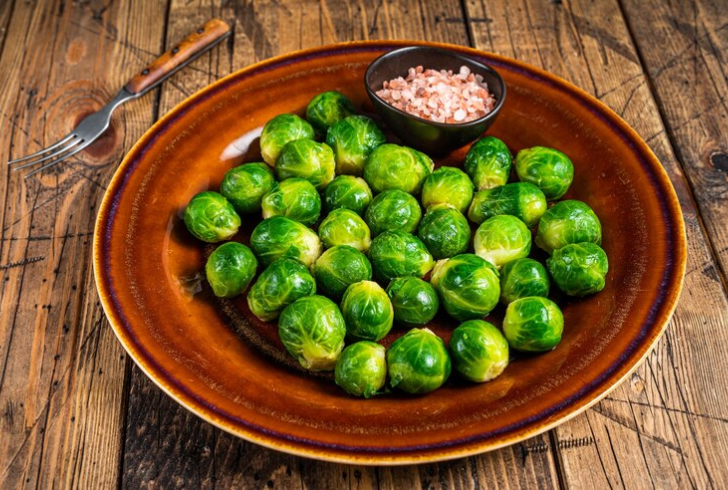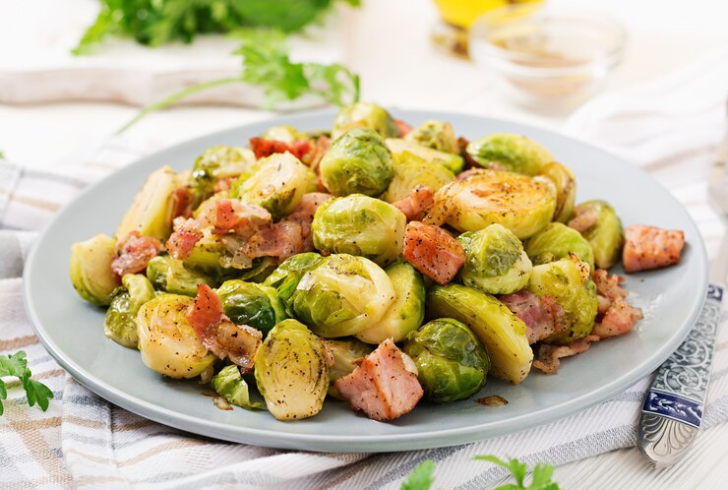
The Best Vegetable for Heart Health, According to a Cardiologist

Brussels sprouts are making a strong comeback, and there’s a good reason why. These small, nutrient-dense vegetables are loaded with heart-friendly benefits, yet they often don’t get the credit they deserve.
According to health experts, adding them to daily meals can support cardiovascular wellness in multiple ways. From fiber and essential vitamins to natural nitrates, Brussels sprouts provide powerful nutrients that promote a healthier heart.
Why Brussels Sprouts Are a Heart-Healthy Powerhouse
1. Packed With Fiber
Many people fall short of their daily fiber intake, but Brussels sprouts offer a simple solution. A single cup provides around six grams of fiber, making it easier to reach the recommended 25 to 38 grams per day.
Fiber plays a significant role in digestion, yet its impact extends far beyond gut health. Research suggests that fiber-rich diets can positively influence gut bacteria, which in turn supports heart function. The process works by promoting beneficial gut microbes that produce short-chain fatty acids, compounds that may help lower blood pressure.
2. Rich in Vitamin K for Arterial Health

Freepik | user6170755| Brussels sprouts are a top source of Vitamin K.
Vitamin K plays a crucial role in maintaining healthy arteries. Brussels sprouts are a top source of this essential nutrient, offering more than twice the daily recommended amount in just one cup of cooked sprouts.
Studies show that vitamin K may help reduce arterial calcification, a condition associated with heart disease. While researchers are still exploring its exact mechanisms, adding vitamin K-rich foods to your diet can support heart health. However, those on blood-thinning medications should consult their doctor before increasing intake.
3. Natural Nitrates for Better Circulation
Unlike processed nitrates found in certain foods, the natural nitrates in Brussels sprouts support cardiovascular health. These compounds convert into nitric oxide in the body, which helps relax and widen blood vessels. This process promotes better circulation, reducing strain on the heart.
Research indicates that the combination of nitrates and vitamin K in Brussels sprouts may help regulate blood pressure. Regularly including them in meals can support smooth blood flow and overall heart function.
4. High in Vitamin C for Heart Protection
Brussels sprouts are a great source of vitamin C, providing nearly a full day’s worth in just one cup. While vitamin C is known for boosting immunity, its heart-protective properties are also significant.
Vitamin C helps neutralize free radicals, reducing oxidative stress that can lead to cardiovascular issues. It also supports nitric oxide production, which enhances blood vessel function.
5. Potassium to Balance Blood Pressure
Potassium is essential for maintaining proper blood pressure, but many people don’t consume enough. Brussels sprouts offer a natural source of this important mineral, helping counteract the effects of excess sodium in the diet.
Potassium helps relax blood vessel walls and reduces sodium retention. This dual action can lower the risk of hypertension, heart disease, and stroke. Including potassium-rich foods like Brussels sprouts can provide long-term cardiovascular benefits.
Delicious Ways to Enjoy Brussels Sprouts
Eating Brussels sprouts doesn’t have to mean settling for bland, boiled vegetables. With a variety of preparation methods, they can be transformed into flavorful and satisfying dishes.
1. Roast or Pan-Fry for Maximum Flavor

Freepik | timolina | Brussels sprouts taste amazing when roasted grilled pan-fried or added to salads.
Tossing Brussels sprouts with olive oil and roasting them brings out their natural sweetness. Adding a drizzle of balsamic glaze or a sprinkle of spices enhances the taste even more. Pan-frying them in extra virgin olive oil also creates a crispy, caramelized texture that pairs well with many meals.
2. Add to Salads for Extra Crunch
Pre-shredded Brussels sprouts make an easy addition to salads, providing both texture and nutrition. They blend well with ingredients like apples, figs, nuts, and a tangy vinaigrette for a refreshing and nutrient-packed dish.
3. Sprinkle on Pizza and Tacos
Brussels sprouts might not be the first topping that comes to mind for pizza or tacos, but they add a unique crunch and flavor. Thinly sliced sprouts can be tossed onto a fresh pizza before baking or mixed into tacos for a nutritious upgrade.
4. Make Them Extra Crispy
For those who love crunch, crispy roasted Brussels sprouts with panko breadcrumbs or Parmesan cheese offer a satisfying bite. Smashed Brussels sprouts, baked until golden and crispy, also make a tasty and healthier alternative to fried snacks.
5. Grill for a Smoky Twist
Brussels sprouts take on a delicious smoky flavor when grilled. Simply coat them in olive oil, season with salt and pepper, and cook them over an open flame. Threading them onto skewers makes grilling even easier.
A Heart-Healthy Addition to Every Meal
Brussels sprouts bring a powerful mix of nutrients that support heart health. Their high fiber content, vitamin K, natural nitrates, vitamin C, and potassium make them a valuable addition to any diet.
With so many ways to prepare them—whether roasted, grilled, air-fried, or added to tacos and salads—there’s no shortage of tasty options. These little green gems are more than just a side dish; they’re a heart-friendly powerhouse worth incorporating into everyday meals.
More in Health & Fitness
-
`
How Long Does a Non Surgical Nose Job Last?
The allure of a sculpted nose without the downtime of traditional surgery has captivated many. Non-surgical rhinoplasty, often dubbed a “liquid...
August 11, 2024 -
`
How to Plan a Trip to Italy and Greece
Italy and Greece stand out as two of Europe’s premier travel destinations, each offering a unique blend of historical grandeur, stunning...
July 31, 2024 -
`
Are Makeup Wipes Bad for Your Skin?
In the quest for quick and convenient skincare, makeup wipes often seem like a miracle solution. However, if you’re wondering, Are...
July 26, 2024 -
`
How to Do Ab Workouts During Pregnancy?
Maintaining core strength is vital, but can you do ab workouts while pregnant? This question is common among expectant mothers eager...
July 19, 2024 -
`
5 Seamless Ways to Minimize BBL Scars
Undergoing a Brazilian Butt Lift (BBL) is an exciting decision for enhancing your body contour. However, BBL scars can be a...
July 12, 2024 -
`
Best Places for Birthday Party Fun for All Ages
Celebrating your birthday at an exciting venue can add that extra spark to your special day, whether you’re with family, friends,...
July 2, 2024 -
`
Skincare for Sensitive Skin: Top 6 Products to Try
Taking care of sensitive skin can be a challenge. With so many products on the market, finding the right ones that...
June 28, 2024 -
`
How to Build Muscles & Gain Mass After 50
Are you wondering how to build muscle mass after 50? You are not alone. Many people think that hitting the big...
June 20, 2024 -
`
How to Speed Up Your Nose Job Recovery Time
Undergoing a rhinoplasty is an exciting step towards a new appearance, but it comes with a recovery period that requires patience...
June 15, 2024















You must be logged in to post a comment Login